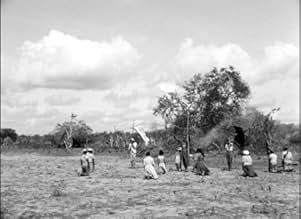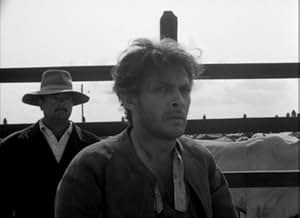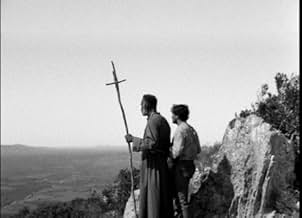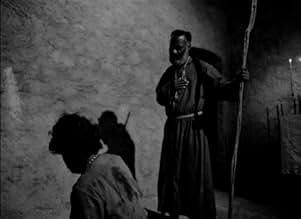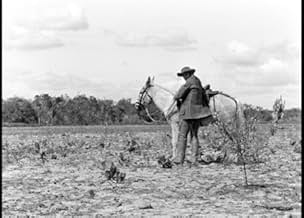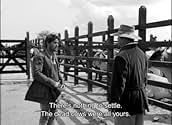IMDb RATING
7.2/10
5.9K
YOUR RATING
After killing his employer when he tries to cheat him out of his payment, a man becomes an outlaw and starts following a self-proclaimed saint.After killing his employer when he tries to cheat him out of his payment, a man becomes an outlaw and starts following a self-proclaimed saint.After killing his employer when he tries to cheat him out of his payment, a man becomes an outlaw and starts following a self-proclaimed saint.
- Director
- Writers
- Stars
- Awards
- 1 nomination total
Milton Rosa
- Moraes
- (as Milton Roda)
Marrom
- Cego Júlio
- (uncredited)
- Director
- Writers
- All cast & crew
- Production, box office & more at IMDbPro
Featured reviews
At just 25, Brazilian director Glauber Rocha directed Black God, White Devil, now considered one of the most important pictures to ever come out of Brazil, and a key entry into the Cinema Novo movement. Combining elements of Sergio Leone, Italian neo-realism, and Soviet propaganda such as the work of Sergei Eisenstein, Rocha created a brutal, grainy world inhabited by suicidal religious fanatics, wandering hit men, and psychopathic bandits. From the opening shots of rotting animal corpses and the endless Brazilian sertão, Rocha portrays a grim social realism, one of the key aspects of Cinema Novo.
Ranch-hand Manuel (Geraldo Del Rey) lives in poverty with his wife Rosa (Yona Magalhaes). Fed up with his situation, he goes into town to sell his stock, only to have his boss try to cheat him out of his money, so Manuel kills him with a machete. Fleeing the authorities, he falls in with maniacal preacher Sebastiao (Lidio Silva), who leads Manuel, Rosa and his other followers on a killing spree. Circumstances lead to Manuel leaving the cause, and joining up with famous bandit Corisco (Othon Bastos), who also leads the couple on an orgy of meaningless violence and thievery. But shadowy gun-for-hire Antonio das Mortes (Mauricio do Valle), having been paid by the church and a poltician, is hot on Corisco's tail.
The film very much reminded me of Cormac McCarthy's astounding novel Blood Meridian, where the sheer brutality of the violence played as a metaphor for a society gone sour and a world intent of self-destruction. Like Blood Meridian's The Kid, Manuel and Rosa follow blindly to whichever cause they see a glimmer of hope in. They fail to see the lunacy of Sebastiao's behaviour, and it's only at the point where he stabs a baby in the heart that their eyes seem to be opened, only for them to shack up with the gibbering Corisco, a man who speaks like a poet but doesn't seem to be able to comprehend his own existence. It is at this point, about two-thirds in, that the film seems to lose momentum and becomes somewhat of an unfathomable mess.
But it isn't just the social-political ponderings that make Black God, White Devil so memorable, it also has style in abundance. The camera-work is shaky and urgent at times, full of character close-ups from awkward angles, but it also uses fast editing reminiscent of Eisenstein's greatest works. Similar to Battleship Potemkin's (1925) Odessa steps sequence, the Monte Santo chapel massacre at the hands of Antonio das Mortes is simply electrifying. It is das Mortes' presence that leads to the moments that evoke the work of Sergio Leone, wrapping the shady anti-hero in moody atmosphere like Clint Eastwood's Man With No Name. It's a dangerous mixture of conflicting styles that works beautifully, making the film beautiful and cool, occasionally horrifying, and undoubtedly important. It's just a shame it doesn't manage to keep up with the absolutely astonishing opening two-thirds.
Ranch-hand Manuel (Geraldo Del Rey) lives in poverty with his wife Rosa (Yona Magalhaes). Fed up with his situation, he goes into town to sell his stock, only to have his boss try to cheat him out of his money, so Manuel kills him with a machete. Fleeing the authorities, he falls in with maniacal preacher Sebastiao (Lidio Silva), who leads Manuel, Rosa and his other followers on a killing spree. Circumstances lead to Manuel leaving the cause, and joining up with famous bandit Corisco (Othon Bastos), who also leads the couple on an orgy of meaningless violence and thievery. But shadowy gun-for-hire Antonio das Mortes (Mauricio do Valle), having been paid by the church and a poltician, is hot on Corisco's tail.
The film very much reminded me of Cormac McCarthy's astounding novel Blood Meridian, where the sheer brutality of the violence played as a metaphor for a society gone sour and a world intent of self-destruction. Like Blood Meridian's The Kid, Manuel and Rosa follow blindly to whichever cause they see a glimmer of hope in. They fail to see the lunacy of Sebastiao's behaviour, and it's only at the point where he stabs a baby in the heart that their eyes seem to be opened, only for them to shack up with the gibbering Corisco, a man who speaks like a poet but doesn't seem to be able to comprehend his own existence. It is at this point, about two-thirds in, that the film seems to lose momentum and becomes somewhat of an unfathomable mess.
But it isn't just the social-political ponderings that make Black God, White Devil so memorable, it also has style in abundance. The camera-work is shaky and urgent at times, full of character close-ups from awkward angles, but it also uses fast editing reminiscent of Eisenstein's greatest works. Similar to Battleship Potemkin's (1925) Odessa steps sequence, the Monte Santo chapel massacre at the hands of Antonio das Mortes is simply electrifying. It is das Mortes' presence that leads to the moments that evoke the work of Sergio Leone, wrapping the shady anti-hero in moody atmosphere like Clint Eastwood's Man With No Name. It's a dangerous mixture of conflicting styles that works beautifully, making the film beautiful and cool, occasionally horrifying, and undoubtedly important. It's just a shame it doesn't manage to keep up with the absolutely astonishing opening two-thirds.
I saw this film on the premise of that it according to critics is the "best Brazilian film of all times". Critics are way too generous to this young auteur influenced by Eisenstein and other masters, mixing genres and styles but only achieving an amateurish, confused, pretentious and quite tasteless work. It is messy, low-budget and is overall not worth watching despite a handful of nice shots and moments. In an accompanying interview to the film, the director Rocha, with Marxist rhetoric, blame European colonists for Latin America's economic problems and justifies the movie's content as "the aesthetics of hunger". To me, more than anything else, it shows the madness of religion and cults and how they attract people in desperation.
This film begins wonderfully, brilliantly shot and keenly acted- but right as you're sure it's coming to a close, the music suddenly runs uptempo and the narrator says the equivalent of "Wait, there's more!" and the second segment of the film destroys any credibility the first might have established. The director's portrayal of the desert's harshness lends logically to the lunacy of the characters- but Rosa's actions in the second half seem completely unmotivated, as if the actors ran out of script and just start making things up out of boredom in front of the camera. Laudable attempts at Eisenstein-style multiple-repeat editing are a good idea but using them to cover the low-budget nature of the action scenes is not. Overall worth seeing, but I must warn you that I fell asleep towards the end.
Like Karl Marx's Communist Manifesto, Deus e O Diabo Na Terra Do Sol, (translated: God and the Devil in Land of Sun) doesn't bother mincing words when addressing what's wrong with the world. As Communism swept through South America and Cuba in the 50's and 60's, Socialist film-making enjoyed its greatest hey dey and, amongst those films, DeODNTDS is remembered as one of the best. Whereas films like Mikhail Kalatozov's I Am Cuba were unabashed agents of propaganda, bashing Capitalism with a hammer-like heavy hand, Glauber Rocha's efforts were hidden behind the symbolism of one man's Chaucer-esque journey into an unknown fate.
The journey is Manuel's, an impoverished farmer who is radicalized after killing his boss who (like evil capitalists do) attempted to cheat Manuel of his wages. Manuel then finds God, in the form of a self-proclaimed Saint named Sebastian. Before long, Sebastian's blood thirsty spell over Manuel is broken by Rosa, Manuel's dutiful (and long-suffering) wife. But soon after they're free from Sebastian's grip, Manuel is seduced by the charms of a charismatic and similarly blood thirsty bandit named Corisco. Such is the way with Manuel, doomed to follow, and it is this theme that strangles the life out of Rocha's film.
DeODNTDS is a scathing indictment of not only capitalism, but also of religion and society as a whole. In this world, man is desperately out of balance with nature (and thus himself), wishing (and prophesying) for the land to turn to sea and the sea to turn to land. These fruitless dreams are a constant reminder that man must look inward, to find strength from his own heart and hands. The message is unmistakable, as stark as the black and white imagery Rocha bombards us with, but the trouble with DeODNTDS is that it makes it's point early on is compelled to repeat it over and over again, not unlike a mantra.The inevitable fate of Manuel is set up mid-way through the first act, when bounty hunter Antonio das Mortes is hired by church and city officials to kill Saint Sebastian and put an end to his proletariat uprising (which threatens the establishment aka the money making machine). But das Mortes' hunt is sidetracked and ultimately stalled to such a degree that by the time he and Manuel come face to face, no real stakes remain. In the process of pitting these two against one another, Rocha's film gets bogged down in dogmatic digressions that drag out for what feels like an eternity. By the time the credits roll, the momentum of the powerful first act is lost, and instead of challenging its audience's socio-political allegiances, Deus eO Diablo Na Terra Do Sol merely challenges you to stay awake.
The journey is Manuel's, an impoverished farmer who is radicalized after killing his boss who (like evil capitalists do) attempted to cheat Manuel of his wages. Manuel then finds God, in the form of a self-proclaimed Saint named Sebastian. Before long, Sebastian's blood thirsty spell over Manuel is broken by Rosa, Manuel's dutiful (and long-suffering) wife. But soon after they're free from Sebastian's grip, Manuel is seduced by the charms of a charismatic and similarly blood thirsty bandit named Corisco. Such is the way with Manuel, doomed to follow, and it is this theme that strangles the life out of Rocha's film.
DeODNTDS is a scathing indictment of not only capitalism, but also of religion and society as a whole. In this world, man is desperately out of balance with nature (and thus himself), wishing (and prophesying) for the land to turn to sea and the sea to turn to land. These fruitless dreams are a constant reminder that man must look inward, to find strength from his own heart and hands. The message is unmistakable, as stark as the black and white imagery Rocha bombards us with, but the trouble with DeODNTDS is that it makes it's point early on is compelled to repeat it over and over again, not unlike a mantra.The inevitable fate of Manuel is set up mid-way through the first act, when bounty hunter Antonio das Mortes is hired by church and city officials to kill Saint Sebastian and put an end to his proletariat uprising (which threatens the establishment aka the money making machine). But das Mortes' hunt is sidetracked and ultimately stalled to such a degree that by the time he and Manuel come face to face, no real stakes remain. In the process of pitting these two against one another, Rocha's film gets bogged down in dogmatic digressions that drag out for what feels like an eternity. By the time the credits roll, the momentum of the powerful first act is lost, and instead of challenging its audience's socio-political allegiances, Deus eO Diablo Na Terra Do Sol merely challenges you to stay awake.
This movie is so fantastic! I've seen it like 10 times or so, and I still get impressed whenever I watch it. Glauber Rocha, who was a total genius, unites various elements of Brazil's Northeastern culture in a great story about alienation of the people. The story is narrated by a singer who impersonates a regional popular singer; and the visual aspects of the film and the tone of black and white are supposed to resemble the rhymes and the woodcut covers which invoke the "literatura de cordel", or "string literature", which is very common in the northeast of Brazil(not so much today, but certainly in the 60's). The film shows how the powerful control the poorest through violence and intimidation, and how religion and the "Cangaço" movement can be bad when a person without perspective and objectives in life get involved with them. Manuel, the main character, is totally alienated by the "black god" Sebastião, which resembles, in many ways, real Brazilian preacher Antônio Conselheiro; and by the "white devil" Corisco(a real Cangaceiro who worked with real and, in the 20's and 30's, widely famous Cangaço boss Lampião), wonderfully performed by Othon Bastos, while the hired gun Antonio das Mortes is on the look for both Sebastião and Corisco through the badlands of Northeast. This is a real masterpiece!!
Did you know
- TriviaIn the scene where we see Manuel (Geraldo Del Rey) carrying a huge stone over his head while climbing Monte Santo on his knees, Del Rey insisted on carrying a real stone that weighted over 20 kilos - something that really worried director Glauber Rocha. After the shooting, Del Rey had to take 2 days off, as he wasn't in condition to show up.
- ConnectionsEdited into A Edição do Nordeste (2023)
- SoundtracksManuel e Rosa
Written by Glauber Rocha & Sérgio Ricardo
- How long is Black God, White Devil?Powered by Alexa
Details
- Release date
- Country of origin
- Official site
- Language
- Also known as
- God and the Devil in the Land of the Sun
- Filming locations
- Production companies
- See more company credits at IMDbPro
Box office
- Gross US & Canada
- $7,826
- Opening weekend US & Canada
- $3,200
- Nov 19, 2023
- Gross worldwide
- $7,826
- Runtime2 hours
- Color
- Sound mix
- Aspect ratio
- 1.37 : 1
Contribute to this page
Suggest an edit or add missing content



